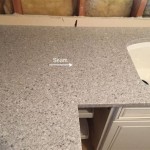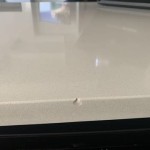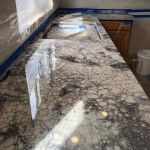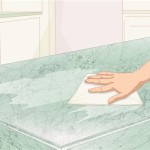Do Granite Countertops Need Sealing?
Granite countertops are a popular choice for many homeowners due to their durability and beauty. However, one common question that homeowners have is whether or not granite countertops need to be sealed. The answer to this question is not always straightforward, as it depends on a number of factors, including the type of granite, the finish of the granite, and how the countertop is used.
In general, granite is a non-porous material, which means that it does not absorb liquids easily. However, some types of granite, such as honed granite, are more porous than others, and may need to be sealed to prevent staining.
The finish of the granite can also affect whether or not it needs to be sealed. Polished granite is less porous than honed granite, and therefore does not need to be sealed as often. However, honed granite has a more matte finish, which can make it more susceptible to staining. As a result, honed granite should be sealed more frequently than polished granite.
How the countertop is used can also affect whether or not it needs to be sealed. If the countertop is used for food preparation, it is more likely to come into contact with liquids and stains. As a result, it is important to seal the countertop more frequently if it is used for food preparation.
If you are unsure whether or not your granite countertop needs to be sealed, it is always best to consult with a professional. A professional can assess the type of granite, the finish of the granite, and how the countertop is used to determine whether or not it needs to be sealed.
How to Seal Granite Countertops
If you decide that your granite countertop needs to be sealed, there are a few steps you can take to do it yourself. First, clean the countertop thoroughly with a mild detergent and water. Rinse the countertop well and allow it to dry completely.
Once the countertop is dry, apply a thin coat of granite sealer to the surface. Use a clean cloth or sponge to apply the sealer, and be sure to work in small sections. Once you have applied the sealer to the entire surface, allow it to dry for the amount of time specified by the manufacturer.
Once the sealer has dried, buff the countertop with a clean cloth to remove any excess sealer. Your granite countertop is now sealed and protected from stains.
How Often Should You Seal Granite Countertops?
The frequency with which you need to seal your granite countertops will depend on the type of granite, the finish of the granite, and how the countertop is used. However, as a general rule, it is a good idea to seal your granite countertops every 1-2 years.
If you notice that your granite countertop is starting to show signs of wear or staining, you may need to seal it more frequently. You can also test the seal on your granite countertop by placing a few drops of water on the surface. If the water beads up, the seal is still intact. However, if the water absorbs into the granite, it is time to reseal the countertop.
Benefits of Sealing Granite Countertops
There are many benefits to sealing your granite countertops, including:
- Prevents staining
- Protects against wear and tear
- Makes the countertop easier to clean
- Enhances the beauty of the countertop

Granite Paste Sealer How To Seal Eagle Stones Marble

How To Treat Seal Granite Marble Countertops Lesher

How Often Should You Seal Granite Countertops Eagle Stones

Is It Necessary To Seal Stone

How Often Do You Have To Seal Granite Counters

How To Clean Seal And Polish Granite Countertops Pro Housekeepers

Sealing Countertops Tips Tricks Sims Lohman Fine Kitchens And Granite

Granite Countertops Sealing Stone Masters

Why Do Natural Stone Countertops Need To Be Sealed Arch City

Tips You Should Know Before Sealing Your Granite Countertops








